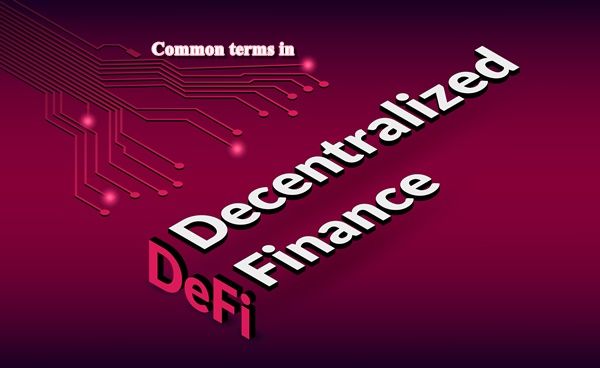
Common terms in DeFi, why is it important to know them well? It is important to understand the terms used in decentralized finance (DeFi) as this can have a significant impact on how you use and understand the various financial products and services associated with it. DeFi is a rapidly evolving field, and the terms used can vary from project to project.
Understanding the terms commonly used in DeFi can help you better understand the risks and opportunities associated with these products and services. For example, understanding what a smart contract or stablecoin is can help you understand how they can be used to make money, or how they can be used to minimize the risks associated with crypto-currency volatility.
Here are some common terms in the field of decentralized finance (DeFi) that can help you understand the important concepts.
Common terms in decentralized finance (DeFi)
ATH:
« ATH is the acronym for ‘All-Time High’ in English, which translates to ‘highest historical level’ in French. It is used to describe the highest level ever reached by a financial asset, such as a stock, cryptocurrency, or another form of investment, since the beginning of its recorded history.
For instance, if the price of a stock reaches its highest level since its initial listing on the stock exchange, it is said to have reached a new ATH. Similarly, for a cryptocurrency, when its price surpasses all previously recorded levels, it’s referred to as a new ATH for that cryptocurrency. »
DAO:
DAO stands for Decentralized Autonomous Organization. It refers to an organization that operates through rules encoded as computer programs called smart contracts, which are built on a blockchain. A DAO is designed to be autonomous, meaning it operates without the need for centralized control or intermediaries.
Flash Lending:
This is a type of decentralized lending where funds are borrowed and repaid in a single transaction, usually within minutes. This allows borrowers to obtain funds quickly to cover short-term liquidity needs.
Non-fungible tokens (NFTs):
These are tokens that are unique and cannot be replaced by another token. NFTs can be used to represent a variety of things, such as digital art, video game components, virtual buildings, etc. They generally work with the ERC-721 and ERC-1155 standards.
Oracle:
In IT and in the context of blockchains, an oracle is a service or entity that acts as an external source of data for smart contracts. Oracles enable smart contracts to receive data from external sources, such as weather data, financial asset prices, sports scores, etc., in order to make decisions or execute actions based on this external data. This external data can be crucial to the execution and logic of smart contracts in many use cases.
Smart Contract:
A smart contract is a computer program that can automatically perform actions based on predefined criteria. In DeFi, smart contracts are often used to create automated protocols that manage the use of funds, lending and borrowing, among other things.
Stablecoin:
A stablecoin is a form of crypto-currency designed to maintain a stable value against an external reference, such as the US dollar, the euro or other tangible assets. Unlike other crypto-currencies, such as Bitcoin or Ethereum, which can experience significant price fluctuations, stablecoins seek to reduce this volatility to guarantee price stability.
Token:
There are two main types of crypto tokens: utility tokens and security tokens. Utility tokens are designed to be used within a specific ecosystem, such as a decentralized application (dApp) or platform. They can be used to purchase goods or services within that ecosystem, or to gain access to certain features or functionality. Security tokens, on the other hand, are created as investments and are intended to provide the holder with a financial return, such as dividends or a share of the company’s profits.
Variable Rate Loan (VRL):
This is the total value of assets that are used to obtain loans on a decentralized lending platform. The higher the TVL a lending protocol has, the more popular and reliable it is considered to be.
Yield Farming:
This is an investment technique in crypto-currencies that involves moving funds between different DeFi protocols to maximize returns. Investors can earn interest, token rewards and cash by lending or providing cash to decentralized lending protocols.
There are of course many other common terms in the DeFi field, depending on the protocols used, these terms above are the most commonly used.
